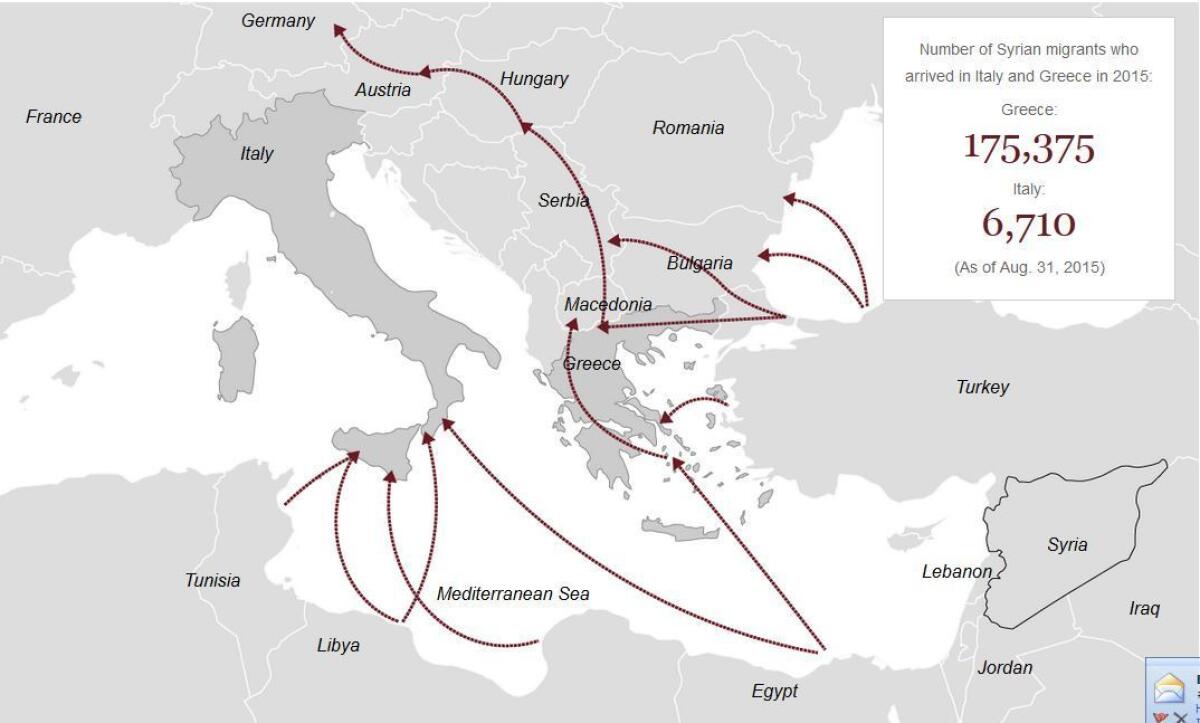The Syrian cease-fire is unlikely to lure many refugees home

The path of Syrian migrants to Germany
- Share via
reporting from berlin — The news that a cease-fire agreement had been reached among warring parties in Syria came as a relief to refugees from the conflict who have made their way to Germany. But it isn’t likely to prompt any mass return – certainly not yet.
“As long as [President Bashar] Assad is still there, I wouldn’t dream of going back,” said Ahmed al Hanawi, a 28-year-old refugee who arrived in Berlin eight months ago after fleeing his hometown of Damascus. He shook his head. “I’d rather be shot to death here in Germany than go back to Syria under Assad,” he said.
As much as some of the 480,000 Syrian refugees in Germany may want to return home, the proposed cease-fire still looks too fragile and riddled with uncertainties, refugees said. And the fact that Assad will remain in power was a deal-breaker for many.
NEWSLETTER: Get the day’s top headlines from Times Editor Davan Maharaj >>
“I don’t think many people will go home based on talk alone,” said one 25-year-old Syrian man, who gave his name only as Dalil – like many, he was nervous about giving his full name. “No one trusts this cease-fire. And as long as Assad’s still in control, it’s unrealistic to think many will go back.”
Over the last few months, there has been a trickle of a few thousand refugees from Syria, Iraq and Afghanistan returning home on their own after giving up on Germany. Many had exaggerated expectations of getting houses and well-paying jobs in Germany right away. Instead, many are housed in mass shelters and stuck in a holding pattern without hopes of finding a job or being reunited with their families.
Some also cite frustration with the slow-moving German bureaucracy, an aversion to German food, and difficulties adapting to the dark, wet weather and the increasingly frosty reception from Germans.
But more than 3,000 refugees a day continue to arrive in Germany, putting strains on social services. Chancellor Angela Merkel has come under pressure in her conservative party to close the door to more refugees.
“We all know from the past experience, so it’s too early to say if this is a breakthrough or not,” said German Foreign Minister Frank-Walter Steinmeier, who was involved in some of the talks in Munich with U.S. Secretary of State John Kerry and his Russian counterpart, Sergei Lavrov. The war has killed more than 200,000 people and triggered the largest refugee crisis in Europe since World War II. “We won’t know for a few days if this was a breakthrough or not.”
Sylvia Glaser, a staff worker at the Coming Home project in Munich, which offers refugees financial and logistical support to return home, said that many Syrians would like nothing more than to return to their country.
“I think there are lots of Syrians ready to go home as soon as possible,” Glaser said, adding that many are single men came to Germany to flee the war but are homesick and miss their families now. “But I don’t think they have a lot of faith yet in this agreement.”
Kirschbaum is a special correspondent.
ALSO
Editorial: Where’s the outrage on Syria?
Airlifts of assistance to begin across Syria
World powers announce plans for cease-fire in Syria after nearly five years of civil war
More to Read
Sign up for Essential California
The most important California stories and recommendations in your inbox every morning.
You may occasionally receive promotional content from the Los Angeles Times.













